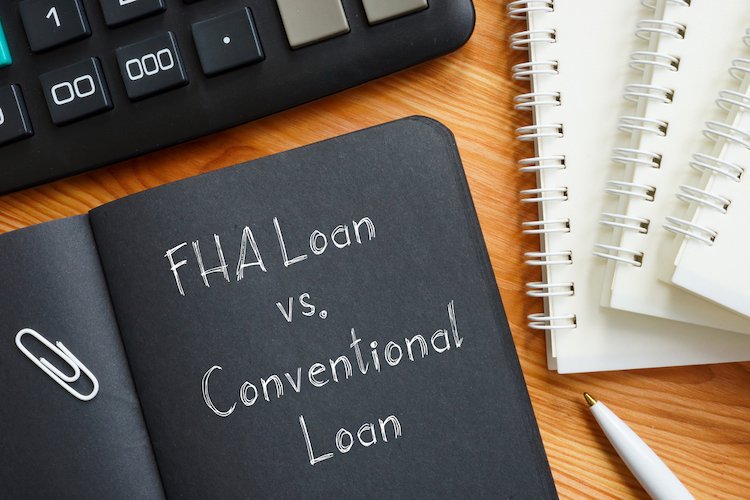FHA vs Conventional loan is one of the most common comparisons people make when trying to decide on the right mortgage option for buying a home. For many buyers, especially those entering the housing market for the first time, understanding the differences between these two loan types can be overwhelming.
The truth is, both FHA and Conventional loans serve the same purpose, helping you finance a home, but they differ in how they are structured, the requirements you need to meet, and the long-term impact they can have on your finances.
Getting this choice right is important because your mortgage is not just a short-term decision; it influences your monthly budget, your overall costs, and even how much flexibility you have as a homeowner. To make the best decision, you need to understand not just the basics of FHA and Conventional loans, but also how they affect things like down payment, credit score requirements, first-time buyer benefits, monthly payments, and the long-term pros and cons of each.
FHA vs Conventional Loan First-Time Home Buyer
For a first-time home buyer, the question of FHA vs Conventional loan often comes up early in the process. Buying a home for the first time can feel intimidating, and affordability is usually the biggest concern. FHA loans were designed with first-time buyers in mind.
They are backed by the Federal Housing Administration and exist specifically to make homeownership more accessible to people who may not have perfect credit or a large amount of money saved up for a down payment. With an FHA loan, first-time buyers can qualify with a credit score as low as 580 if they want to put down the minimum 3.5% down payment.
Some lenders even accept scores lower than that if the buyer can put down at least 10%. This flexibility opens the door for buyers who might otherwise struggle to qualify for a traditional mortgage. Another advantage for first-time buyers is that FHA loans allow higher debt-to-income ratios, which means you can qualify even if you have other debts, like student loans or car payments.
On the other hand, Conventional loans, which are not government-backed, tend to have stricter requirements. They are typically better suited for first-time buyers who have stronger credit histories and a larger savings cushion for a down payment. However, many first-time buyers choose Conventional loans as well, especially if they are looking to avoid long-term mortgage insurance costs, which are a permanent feature of FHA loans unless you refinance.
The decision between FHA vs Conventional loan for first-time buyers often comes down to financial preparation. If you have limited savings and average credit, FHA may be the safer choice to get you into a home sooner. If you have strong credit and can save for a larger down payment, a Conventional loan could save you more money over the life of the mortgage.
READ MORE
Everything to Know About The Top Loan Requirements in Dubai Islamic Bank
What Are The Top Loan Requirements in China Bank?
Working Capital Loan Requirements: Everything You Must Know Before Applying
Everything To Know About CHFA Loan Requirements

FHA vs Conventional Loan Down Payment
One of the biggest questions buyers ask is how much money they need upfront, which is why the FHA vs Conventional loan down payment comparison is so important. Down payments can make or break a deal for many buyers, and each loan type handles this differently. With FHA loans, the minimum down payment requirement is 3.5% of the home’s purchase price if your credit score is 580 or higher.
For example, on a $250,000 home, that comes out to $8,750. If your credit score falls between 500 and 579, you’ll need to make at least a 10% down payment, which increases the upfront cost significantly. While FHA loans make it easier to buy a home with less money saved, they do come with additional costs in the form of upfront and annual mortgage insurance premiums.
Conventional loans also offer low down payment options, but the rules are different. Many lenders allow a 3% down payment for first-time buyers with good credit, which can be slightly lower than FHA’s 3.5%. On that same $250,000 home, a 3% down payment would be $7,500.
However, with a Conventional loan, the higher your credit score, the better your terms will be. Unlike FHA, where the mortgage insurance is fixed, Conventional loan private mortgage insurance (PMI) can eventually be removed once you build up 20% equity in your home.
This means that in the long run, Conventional loans often provide more savings on mortgage insurance. For buyers planning to stay in their home for many years, this makes Conventional loans more appealing. But for those who need a way into homeownership with a smaller upfront cost and don’t mind paying mortgage insurance long-term, FHA loans may be the better fit.
FHA vs Conventional Loan Credit Score Requirements
Credit scores play a major role in qualifying for a mortgage, and the FHA vs Conventional loan credit score requirements highlight how different these programs really are. FHA loans are well-known for being more flexible when it comes to credit. As mentioned earlier, you can qualify for an FHA loan with a score as low as 580 for a 3.5% down payment.
Even if your score is as low as 500, you may still qualify if you can put down 10%. This makes FHA loans a lifeline for people with less-than-perfect credit histories. The tradeoff, however, is that you’ll be required to pay mortgage insurance for the life of the loan unless you refinance into a Conventional mortgage later.
Conventional loans, on the other hand, set the bar higher. Most lenders prefer a minimum credit score of 620, though higher scores open the door to better interest rates and lower PMI costs. For example, a borrower with a 740 credit score may qualify for a much lower monthly payment on a Conventional loan compared to someone with the same income and down payment but a 620 score.
This difference can be decisive. If your credit is below average, an FHA loan is often the only realistic option to buy a home. If your credit is strong, a Conventional loan usually gives you more favourable terms, and the long-term cost can be much lower.
FHA vs Conventional Loan Pros and Cons
Looking at FHA vs Conventional loan pros and cons gives a clearer picture of which option might work better for different buyers. Both have their advantages and drawbacks, and understanding them helps buyers make a confident choice.
The main advantage of FHA loans is accessibility. They make it possible for buyers with lower credit scores, smaller down payments, or higher debt-to-income ratios to still achieve homeownership. FHA loans also tend to have more flexible underwriting, meaning that life circumstances like student debt or limited credit history are less likely to disqualify you.
The downside of FHA loans is the cost of mortgage insurance. Borrowers must pay an upfront mortgage insurance premium and then continue to pay annual premiums every year for the life of the loan. Unlike Conventional loans, there’s no way to remove this insurance unless you refinance once you’ve built equity. This adds up to a significant expense over time.
Conventional loans, on the other hand, reward strong financial profiles. With a higher credit score and larger down payment, you can secure lower interest rates and avoid long-term PMI costs. The flexibility to remove PMI once you reach 20% equity is a major financial advantage.
Conventional loans also tend to offer more options for property types and loan amounts, making them a better fit for buyers looking at higher-priced homes. The tradeoff is that Conventional loans are less forgiving. If your credit score or financial profile isn’t strong, you may face higher interest rates or struggle to qualify altogether.
PEOPLE ALSO READ
What You Need to Know About Loan Requirements Pag-IBIG
Loan Requirements AFPSLAI, Complete Guide for Military & Uniformed Personnel
Everything About Top Loan Requirements in Metrobank
FHA vs Conventional Loan Monthly Payment
One of the most important parts of the FHA vs Conventional loan decision is how it affects your monthly payment. After all, this is the cost you’ll be responsible for month after month, and it needs to fit within your budget. FHA loans often result in lower initial monthly payments because of the lower interest rates that are sometimes offered to offset the risk.
However, the required mortgage insurance premiums significantly add to the cost. For example, even if your interest rate is slightly lower with an FHA loan, the ongoing insurance fees can make your monthly payment higher compared to a Conventional loan with the same loan amount.
Conventional loans may have slightly higher interest rates depending on your credit score, but the key difference is in mortgage insurance. With a Conventional loan, PMI is based on your credit score and down payment amount, and it can eventually be cancelled once you build equity. This means that over time, your monthly payments will likely decrease, making Conventional loans more affordable in the long run for qualified buyers.
In practical terms, an FHA loan may help you qualify for a home sooner with smaller upfront costs, but a Conventional loan can give you more control and savings over time. When comparing FHA vs Conventional loan monthly payments, it often comes down to your long-term financial goals.
Conclusion
The decision between FHA vs Conventional loan is one of the most important financial choices you’ll make when buying a home. FHA loans are designed to help more people achieve homeownership by offering flexibility on credit scores, debt levels, and down payments. They are often the best choice for first-time buyers who need more accessible options.
Conventional loans, however, reward stronger financial profiles with lower long-term costs, more flexibility, and the ability to remove mortgage insurance once enough equity is built. Choosing the right loan comes down to where you are financially today and what your goals are for the future. If you need a way into the market with limited savings and average credit, FHA may be the right path.
If you can afford a larger down payment and have strong credit, Conventional loans will usually save you more money in the long run. Both loan types serve an important role in making homeownership possible. By understanding the differences in down payment, credit requirements, first-time buyer advantages, pros and cons, and monthly payment impact, you can make an informed decision and choose the loan that truly fits your financial situation and long-term goals.

1 thought on “Everything To Know About FHA vs Conventional Loan”